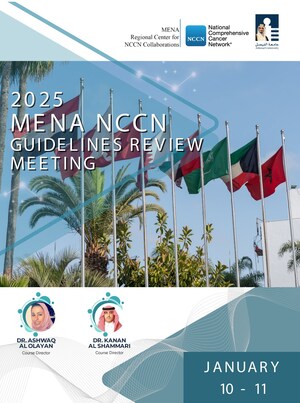FORT WASHINGTON, Pa., Feb. 3, 2017 /PRNewswire-USNewswire/ -- A very rare sub-type of Non-Hodgkin's Lymphoma, Waldenström's Macroglobulinemia affects approximately 1,500 – 2,000 people in the United States each year. While it is not curable, Waldenström's Macroglobulinemia is slow growing, and in many patients, manageable as a chronic disease. To that end, it is important that patients diagnosed with Waldenström's Macroglobulinemia have access to up-to-date disease management information in order to work alongside their treatment teams to make informed care decisions.
To give patients access to the same treatment information their doctors use, the National Comprehensive Cancer Network® (NCCN®) has published the NCCN Guidelines for Patients® and NCCN Quick Guide™ sheet for Waldenström's Macroglobulinemia/Lymphoplasmacytic Lymphoma. Provided through support from the NCCN Foundation®, these education resources inform patients and caregivers about available treatment options.
"The treatment approach to patients with Waldenström's Macroglobulinemia has significantly changed in the recent years with better understanding of the disease biology and its natural history and availability of new drugs, allowing for a more individualized approach. The revised guidelines reflect these changes and will be a valuable guide for patients in shared decision-making with their oncologists," said Shaji Kumar, MD, Mayo Clinic Cancer Center, Chair, NCCN Guidelines Panel for Waldenström's Macroglobulinemia.
These resources are accessible free of charge on NCCN.org/patients, as well as on the free NCCN Patient Guides for Cancer mobile app, available for Android and iOS devices.
NCCN Guidelines for Patients, patient-friendly adaptations of the NCCN Clinical Practice Guidelines in Oncology (NCCN Guidelines®), are easy-to-understand resources based on the same clinical practice guidelines used by health care professionals around the world to determine the best way to treat a patient with cancer. Each resource features unbiased expert guidance from the nation's leading cancer centers designed to help people living with cancer talk to their physicians about the best treatment options for their disease.
NCCN Guidelines for Patients and NCCN Quick Guide™ sheets—one-page summaries of key points in the patient guidelines—are written in plain language and include patient-friendly elements, such as questions to ask your doctor, a glossary of terms, and medical illustrations of anatomy, tests, and treatment. NCCN Guidelines for Patients and NCCN Quick Guide™ sheets DO NOT replace the expertise and clinical judgment of the clinician.
NCCN currently offers NCCN Guidelines for Patients for the following: Brain, Breast, Colon Esophageal, Kidney, Non-Small Cell Lung, Ovarian, Pancreatic, Prostate, and Stomach Cancers; Acute Lymphoblastic Leukemia; Adolescents and Young Adults with Cancer; Chronic Lymphocytic Leukemia; Chronic Myelogenous Leukemia; Hodgkin Lymphoma; Lung Cancer Screening; Malignant Pleural Mesothelioma; Melanoma; Multiple Myeloma; Nausea and Vomiting; Non-Hodgkin's Lymphomas; Soft Tissue Sarcoma; and Waldenström's Macroglobulinemia.
The NCCN Guidelines for Patients and NCCN Quick Guide™ sheet for Waldenström's Macroglobulinemia/Lymphoplasmacytic Lymphoma are available to download for free from NCCN.org/patients and on the NCCN Patient Guides for Cancer mobile app.
About NCCN Foundation
NCCN Foundation® was founded by the National Comprehensive Cancer Network® (NCCN®) to empower people with cancer and advance oncology innovation. NCCN Foundation supports people with cancer and their caregivers at every step of their treatment journey by delivering unbiased expert guidance from the world's leading cancer experts through the library of NCCN Guidelines for Patients® and other patient education resources. NCCN Foundation is also committed to advancing cancer treatment by funding the nation's promising young investigators at the forefront of cancer research, initiating momentum in their careers and furthering the betterment of patients through their groundbreaking innovations. For more information about NCCN Foundation, visit NCCNFoundation.org.
About the National Comprehensive Cancer Network
The National Comprehensive Cancer Network® (NCCN®), a not-for-profit alliance of 27 of the world's leading cancer centers devoted to patient care, research, and education, is dedicated to improving the quality, effectiveness, and efficiency of cancer care so that patients can live better lives. Through the leadership and expertise of clinical professionals at NCCN Member Institutions, NCCN develops resources that present valuable information to the numerous stakeholders in the health care delivery system. As the arbiter of high-quality cancer care, NCCN promotes the importance of continuous quality improvement and recognizes the significance of creating clinical practice guidelines appropriate for use by patients, clinicians, and other health care decision-makers.
The NCCN Member Institutions are: Fred & Pamela Buffett Cancer Center, Omaha, NE; Case Comprehensive Cancer Center/University Hospitals Seidman Cancer Center and Cleveland Clinic Taussig Cancer Institute, Cleveland, OH; City of Hope Comprehensive Cancer Center, Los Angeles, CA; Dana-Farber/Brigham and Women's Cancer Center | Massachusetts General Hospital Cancer Center, Boston, MA; Duke Cancer Institute, Durham, NC; Fox Chase Cancer Center, Philadelphia, PA; Huntsman Cancer Institute at the University of Utah, Salt Lake City, UT; Fred Hutchinson Cancer Research Center/Seattle Cancer Care Alliance, Seattle, WA; The Sidney Kimmel Comprehensive Cancer Center at Johns Hopkins, Baltimore, MD; Robert H. Lurie Comprehensive Cancer Center of Northwestern University, Chicago, IL; Mayo Clinic Cancer Center, Phoenix/Scottsdale, AZ, Jacksonville, FL, and Rochester, MN; Memorial Sloan Kettering Cancer Center, New York, NY; Moffitt Cancer Center, Tampa, FL; The Ohio State University Comprehensive Cancer Center - James Cancer Hospital and Solove Research Institute, Columbus, OH; Roswell Park Cancer Institute, Buffalo, NY; Siteman Cancer Center at Barnes-Jewish Hospital and Washington University School of Medicine, St. Louis, MO; St. Jude Children's Research Hospital/The University of Tennessee Health Science Center, Memphis, TN; Stanford Cancer Institute, Stanford, CA; University of Alabama at Birmingham Comprehensive Cancer Center, Birmingham, AL; UC San Diego Moores Cancer Center, La Jolla, CA; UCSF Helen Diller Family Comprehensive Cancer Center, San Francisco, CA; University of Colorado Cancer Center, Aurora, CO; University of Michigan Comprehensive Cancer Center, Ann Arbor, MI; The University of Texas MD Anderson Cancer Center, Houston, TX; University of Wisconsin Carbone Cancer Center, Madison, WI; Vanderbilt-Ingram Cancer Center, Nashville, TN; and Yale Cancer Center/Smilow Cancer Hospital, New Haven, CT.
Clinicians, visit NCCN.org. Patients and caregivers, visit NCCN.org/patients. Media, visit NCCN.org/news.
Media Contact:
Katie Kiley Brown, NCCN
215-690-0238
[email protected]
SOURCE National Comprehensive Cancer Network
Related Links
WANT YOUR COMPANY'S NEWS FEATURED ON PRNEWSWIRE.COM?
Newsrooms &
Influencers
Digital Media
Outlets
Journalists
Opted In






Share this article